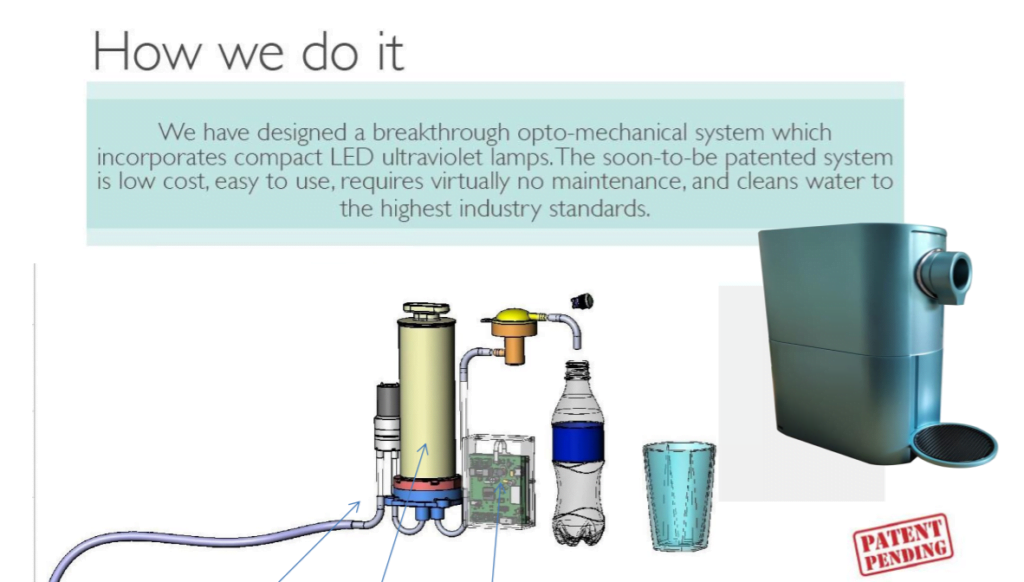A person cannot live without water — but somehow millions of Jews survived in the dry and arid desert for forty years. How did they do it without an endless supply of H2O? The answer, according to Parshat Chukat in the Hebrew Bible, is that water was provided to them through a rock shaped like a sieve that came to be known as Miriam’s Well. In the portion of the Torah where this is found, the reader learns that when Miriam died there was a water shortage — which shows the readers that the well existed in Miriam’s merit.
Israeli water tech startup Alumor is eager to improve the world through its own miracle — a solar-powered water purifying domestic device they fittingly call Miriam’s Well.
The device has a water purification technology based on ultraviolet LED light, which can purify any type of surface water, including lakes, rivers, lagoons, and pools. “The product is low cost, easy-to-use, and cleans the bacteria from water to the highest industry standards,” Alumor’s David Waimann, head of business development tells NoCamels.

The solution, developed by four experienced scientists and technologists, is a lamp that is Class A effective, killing off dangerous parasites and viruses. It includes clever optics and a particle filter that produces water at less than .5 cents a liter. It also uses little energy, just 4 watts via a solar panel, and produces a liter of water every 30 seconds.
“It really is a miracle,” Waimann adds.
In a sit-down interview with NoCamels this month, Waimann explains why the company’s goal for this “very important piece of technology” is to have a place in “every single country in Africa.”
SEE ALSO: How Israel’s Tech Protects The World’s Most Scarce, Essential Resource: Water
We wanted to produce a system that is right for the needs of the poorest of the third world, he explains.
A one-pager detailing Alumor given to NoCamels says that the company’s dream is that the device “will be used one day by more than 100 million around the world, saving 100,000 lives.”
“This is what brought a development economist like me on board to be part of the company,” Waimann adds.
“I studied economics originally and I was fascinated by that, but I also worked various international organizations like the World Bank and the UN. And I was a British Peace Corps VSO (voluntary service overseas) in Africa. That’s what I cared about. I loved it. It was really important to me and still is something which I care about,” Waimann says.
Waimann wasn’t sure he could make a career out of these interests, so he ended up training as an optical engineer and working as a technician in a laser company, where the head of optics was Yacov Malinovich, a physicist and expert in optimal systems for the medical and industrial sectors. Fast forward 25 years later and Malinovich called him to tel him about his project “in the field of water treatment. He asked if Waimann would help them out with their marketing.
Sign up for our free weekly newsletter
SubscribeBy then, co-founder Eldad Maziel, CTO, was also involved. Later, Ofri Orgad, a hydrologist and water aid specialist joined as chief marketer. Israeli-American entrepreneur Yossi Abramowitz also consults with the team.
“I was intrigued by this company because of one of the biggest problems in the world is unclean water for poor people. They can get water, there’s no shortage of water, but it’s just full of all kinds of bacteria, which kill you. In the west, we turn on the tap and don’t even worry about it,” Waimann says.

Alumor is currently in a pre-seed stage and has received a grant of $142,000 from the Israel Innovation Authority. While NoCamels did get to see a prototype of the product, Waimann says they are not taking orders yet but are looking for funding and investors.
Miriam’s Well is meant to be used in a village setting where one person would house the product and residents would come to a specific location for clean water. The village design would be sold for about $50 as a social good (not for profit) The company is currently in contact with various NGOs and governments that will be partners in distribution.
The solution for clean water
Figures from World Health Organization (WHO) in 2017 suggest 2.1 billion people lack drinking water, 1.4 billion of which need an efficient and sustainable solution, like a household water treatment device, to purify their water to the point of use. The WHO states for those families that need these household water treatment systems, the systems need to be cheap and sterilize water to a high level. The water purification tech should ensure that all bacteria and viruses are killed.
Present solutions are either costly, ineffective, or just simply slow and cumbersome to use, Waimann explains. He refers to existing methods such as chlorination, the process of adding chlorine or chlorine compounds to kill bacteria and microbes and prevent waterborne disease, membrane filtration, a method of separating particles in liquid solutions, and flocculants, which are used in wastewater treatment as substances that promote the agglomeration of fine particles present in a solution.

“All these solutions have real drawbacks,” he says. “They either don’t clean the water or they’re expensive. They’re just not convenient. Putting a bottle on the roof, schlepping it up there, putting it down. Or you’re putting the chlorine tablets in before you drink. It’s not happening. It’s just not happening.”
“Today, you buy a plastic bottle of water that measures a liter in the shops. It costs five shekels. We are not producing a device that gives you water for five shekels. It gives you water for roughly one agora [Israel denomination of currency. 1 shekel is roughy 100 agorot.] It’s about a 500th of what you are buying in the supermarket,” says Waimann.
There’s no need for continuous maintenance on the product. Waimann tells NoCamels it needs to be cleaned about every six months or so. That only means washing out the filter.
Alumor is also developing a city design dubbed Nammu. For this project, machines would be placed free of charge at convenience stores and owned by the distributor. The machine has an internal module that monitors water consumption. The store owner and the country distributor would share revenues.
According to Alumor, Oceo Water of India, a consumer service company that provides water purification services, has expressed interest in ordering 10,000 of the Nammu product in two years.
Related posts

Editors’ & Readers’ Choice: 10 Favorite NoCamels Articles

Forward Facing: What Does The Future Hold For Israeli High-Tech?

Impact Innovation: Israeli Startups That Could Shape Our Future




Facebook comments